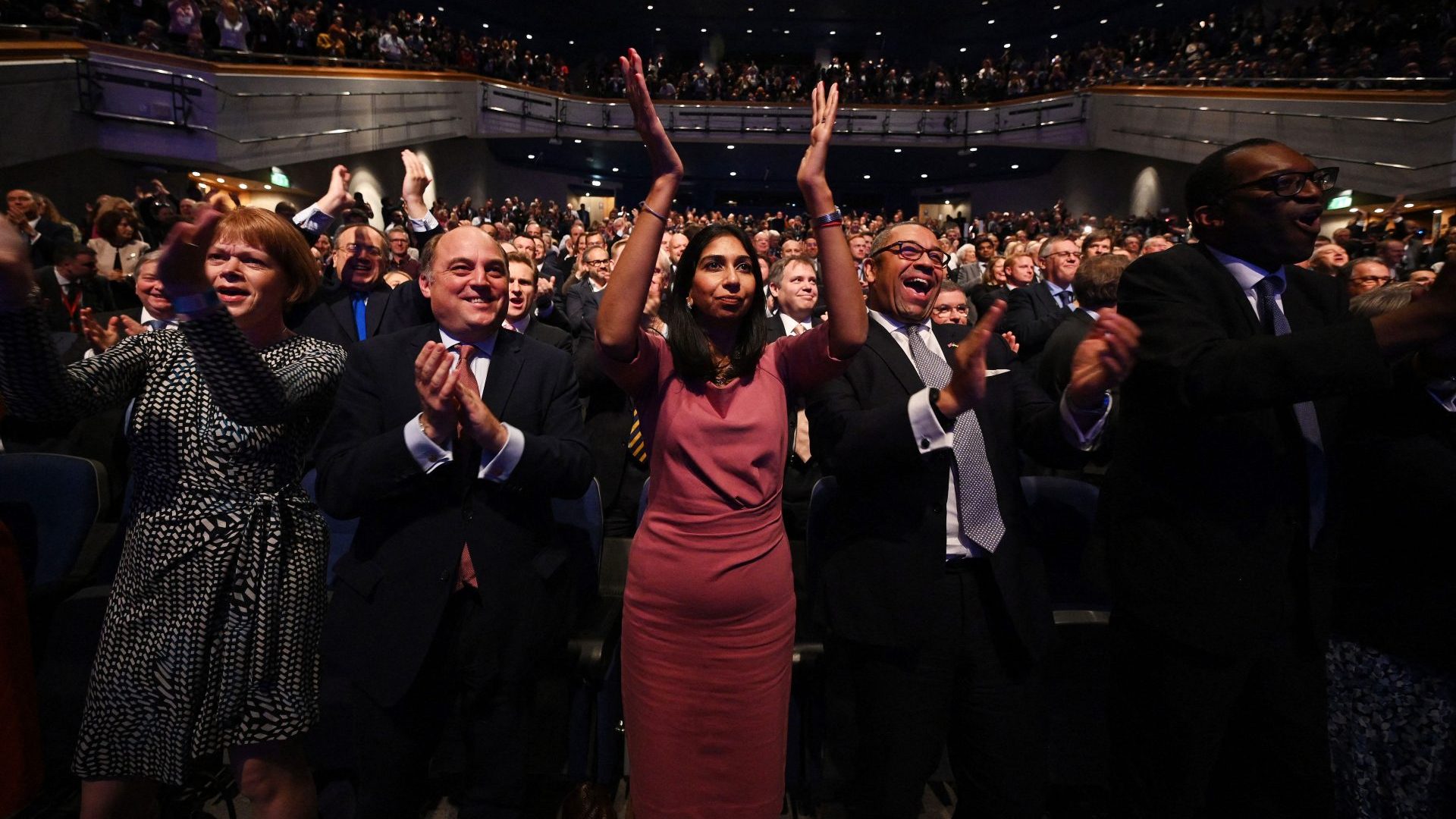Had someone announced Rishi Sunak’s deal – and that it seemed to have passed largely without controversy – at the heights of the Brexit furore in 2019, it would have seemed like momentous political news, if also drastically unlikely.
Now that the moment has finally come, it feels anything other than momentous. Within days, the media was dominated – thanks to a combination of Sue Gray’s prospective appointment as Keir Starmer’s chief of staff and the leaking of Matt Hancock’s WhatsApp messages – by discussing (yet again) partygate, Boris Johnson, Covid, and propriety.
In a sense, that is probably good for the new Northern Ireland deal. It suggests that as the time since the 2016 Brexit vote increases, the political heat is dissipating from the issue. A wearier political and public mood is shifting the incentives away from promising the impossible to just trying to get something done.
The will of the public at large to keep relitigating the same issues is passing – with crisis after crisis across the country, from train strikes to a crumbling NHS, people have limited patience for manufacturing new ones, or prolonging unnecessary ones.
The occasional Conservative backbencher (particularly Boris Johnson) and the Democratic Unionist Party may try to throw a wrench in the works, but the expectation is largely that this deal is done.
The policy benefits for Sunak and the UK are fairly clear: with this issue settled, the prospect of cooperation on other matters become much more realistic. Sunak may get some EU help on small boats, which could work to his political advantage, and the prospect of cooperation on science and tech policy and research is now much more real.
For the opposition, the deal raises perhaps more questions than it does for government. Does it change the political calculus coming up to the next election? Should it spell a change in Labour’s own strategy – either on Europe or more broadly? Was offering the party’s support for the deal a mistake?
The first question is perhaps the easiest one: Rishi Sunak seems deeply unlikely to get a significant poll boost from the Northern Ireland protocol. The same dynamics that made it possible to pass – the passage of time and a public weariness over Brexit – serve to minimise the theoretical chances of a major poll boost intrinsic to the deal.
Added to that, Sunak is a predictably unlucky general, with Conservative infighting – and misplaced attacks on Starmer’s appointment of Sue Gray (of partygate investigation fame) – reigniting old divides. Sunak and his team worked earnestly and seriously for months to achieve a deal, only for his party to immediately reveal just how unserious it still is.
Starmer does not need to panic immediately about a huge turning of the polls. Virtually every pundit – and most Labour MPs and staffers when they’re off the record – expects the polls to tighten before the next election, but this doesn’t seem like the event to initiate that process. Starmer is rarely one to leap to hasty action, and he doesn’t seem set to do so now.
There is one particular manifesto area – carefully avoided until now – that Sunak’s deal may reopen, and that is Labour’s attitude towards the European Union when it’s in government. Many readers will undoubtedly be hoping Starmer, who supported Remain and was a supporter of a second referendum, reconsiders joining either the single market or even rejoining the EU.
They are likely to be disappointed. Sunak managed to get concessions from his own party on building a closer cooperative relationship with the EU over Northern Ireland thanks to the political heat dissipating from Brexit. If Starmer tries to make some form of reversal of Brexit a major part of the Labour manifesto, all of that heat comes back at once.
The polls suggest the support for Brexit is not what it is, and that there is no shortage of Leave voters who now think Brexit was a mistake. That is not necessarily the same as saying there is significant appetite in the short term to relitigate it. Sunak’s Northern Ireland deal let us move on to focus on other things – if Labour suddenly moves Brexit up the agenda, they may take a significant popularity hit for doing so.
The distribution of voters also plays against Labour making EU cooperation a major part of its manifesto. Conservative voters still overwhelmingly support Brexit. A majority of Labour voters backed Remain, and a sizeable share of its Brexiteers now think it’s a mistake – but taking a clear stance on this issue would be more likely to split the Labour vote than the Tory base. It could also give the Conservatives an effective way to fight back against their right flank, and Reform UK.
The Tories would love a fight on the EU, and so Keir Starmer would be foolish to give it to them. Instead, at least for a first term, they would be more sensible to continue along the direction that Sunak has started – on this issue, at least. Sunak is a Brexiteer who has opened the door to closer cooperation with the EU.
Given that, a Labour government could surely continue to find more ways to make the relationship closer than it already is – without the inevitable accusations of “betraying Brexit” landing properly.
Instead of making a closer relationship a big part of its political play, they should speak about it as little as possible, and try to get what is practically possible – which would benefit the country (and growth) in its own right, while potentially opening up the door to a new formal relationship down the line.
Labour supporting Sunak’s deal helps with this – the Northern Ireland protocol was a problem that genuinely needed solving, and so Labour can take the high ground that they put nation before party in this instance. But it also allows them to credibly say they have supported sincere efforts
to make Brexit work as well as it can, and to frame closer cooperation with the European Union as efforts to do just that.
None of this will do much to counter the wider critique against Starmer – that of managerialism. Sunak is positioning himself on competence, setting five pledges to judge him by. Starmer is positioning himself on competence, setting his party five missions to improve the nation.
The difference is hardly inspiring. Starmer’s appointment of Sue Gray – a longtime fixture of the senior civil service, and an establishment figure whose integrity until last week was beyond reproach – smacks of that competent, business-as-usual, approach. Is that what the public wants? The question is whether people feel like the country needs a few tweaks around the edges in order to function properly, or whether it needs a significant change of course. Most of us would lean towards the latter – growth is stagnant, people can’t pay their bills, and public services are in the doldrums.
That suggests we are heading towards a “change” election with an opposition frantically playing the “business as usual” tune. Pushing stability on the EU is likely sensible, but pushing it more broadly sounds like a loser.
Starmer’s missions received an endorsement of sorts from former Ed Miliband advisor Tom Hamilton, who suggested in a post that they should be considered less as a public-facing proposition and more one about focusing the party and its policies – shadow cabinet ministers formulating policies can be asked which of the five missions that policy would service. The focuses for the manifesto start to emerge naturally out of policymaking. There may be method to the madness.
But the public need more. For 13 years of Conservative government, the public has been paying more in tax and getting less back in services. That is the kind of thing that destroys people’s faith in government, especially when it is alongside constant scandals and spending waste.
Restoring trust means reforming Westminster – and Labour has said far too little on that – but it also means offering the public services that they can believe in. Labour under Starmer can’t just promise to make tomorrow slightly less worse than today, it needs a proposition that suggests the public sector can serve the nation, beyond merely offering sticking plasters in
a crisis. Labour needs a flagship policy, and it needs it urgently – and it should not be remotely related to the EU. Ideally it needs to be something that will affect almost everyone, not just some vulnerable group. And it needs to be something that the public will generally be happy to spend serious money on, feeling like they get some benefit.
The obvious policy is a National Childcare Service: high-quality pre-school childcare, available to everyone, either entirely free or with generous means-testing. No one should be forced to take it, but it shouldn’t be conditional on work either – if you want to send your child, you should be able to.
Not only could this boost productivity in the short term by helping parents work, it could – if run like Sure Start – reduce future inequality. And it can be framed as an investment in the future. For a public who have spent more than a decade seeing the public sector offer less and less, it would remind people the next election is a real choice.
Does Starmer have the nerve to make the public a real offer – or will it be more of the same, but less bad?




